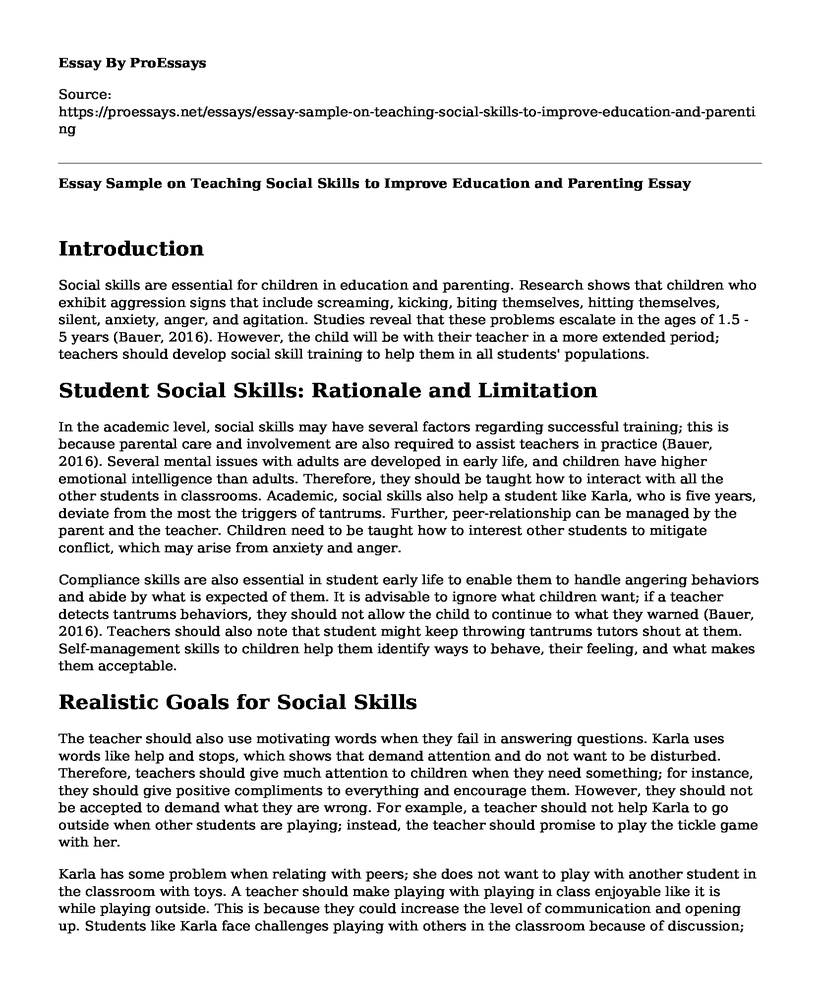Introduction
Social skills are essential for children in education and parenting. Research shows that children who exhibit aggression signs that include screaming, kicking, biting themselves, hitting themselves, silent, anxiety, anger, and agitation. Studies reveal that these problems escalate in the ages of 1.5 - 5 years (Bauer, 2016). However, the child will be with their teacher in a more extended period; teachers should develop social skill training to help them in all students' populations.
Student Social Skills: Rationale and Limitation
In the academic level, social skills may have several factors regarding successful training; this is because parental care and involvement are also required to assist teachers in practice (Bauer, 2016). Several mental issues with adults are developed in early life, and children have higher emotional intelligence than adults. Therefore, they should be taught how to interact with all the other students in classrooms. Academic, social skills also help a student like Karla, who is five years, deviate from the most the triggers of tantrums. Further, peer-relationship can be managed by the parent and the teacher. Children need to be taught how to interest other students to mitigate conflict, which may arise from anxiety and anger.
Compliance skills are also essential in student early life to enable them to handle angering behaviors and abide by what is expected of them. It is advisable to ignore what children want; if a teacher detects tantrums behaviors, they should not allow the child to continue to what they warned (Bauer, 2016). Teachers should also note that student might keep throwing tantrums tutors shout at them. Self-management skills to children help them identify ways to behave, their feeling, and what makes them acceptable.
Realistic Goals for Social Skills
The teacher should also use motivating words when they fail in answering questions. Karla uses words like help and stops, which shows that demand attention and do not want to be disturbed. Therefore, teachers should give much attention to children when they need something; for instance, they should give positive compliments to everything and encourage them. However, they should not be accepted to demand what they are wrong. For example, a teacher should not help Karla to go outside when other students are playing; instead, the teacher should promise to play the tickle game with her.
Karla has some problem when relating with peers; she does not want to play with another student in the classroom with toys. A teacher should make playing with playing in class enjoyable like it is while playing outside. This is because they could increase the level of communication and opening up. Students like Karla face challenges playing with others in the classroom because of discussion; therefore, teachers should use group interaction and also engage fully in plays. They also involve games which are not based on the win-lose situation.
Teachers should avoid the development of an attitude, which shows lack of compliance. For instance, they should show children that it is wrong to go outside without permission. Teachers should use luring methods like an enticing promise (Frydendall et al., 2001). Further, following Karla case, teachers should assist students when they want to go to the toilet. To perfect compliance skills, students may be denied whatever they like most so that they can always comply.
The idea of assisting children in the toilet, is an excellent rationale to enable self-management skills. A teacher should also include other tactics like a positive compliment when show laces are tightened. However, teachers show not be hard on children; instead, they should use mythical stories in negative behaviors (Frydendall et al., 2001).
References
Bauer, M. E. (2016). Response to Intervention in the Kindergarten Classroom. Retrieved from https://digitalcommons.hamline.edu/hse_all/4091/
Frydendall, P., LeWald, K., Walls, J., & Zarring, E. (2001). Decreasing Disruptive Behaviors through Social Skills Instruction. https://eric.ed.gov/?id=ED454482
Cite this page
Essay Sample on Teaching Social Skills to Improve Education and Parenting. (2023, Feb 06). Retrieved from https://proessays.net/essays/essay-sample-on-teaching-social-skills-to-improve-education-and-parenting
If you are the original author of this essay and no longer wish to have it published on the ProEssays website, please click below to request its removal:
- Industrial Relations Essay
- Evaluation Essay on Institute for Global Ethics
- The Single-Sex High School as a Feature of Secondary Education Has Lost Its Relevance - Argumentative Essay
- Essay Sample on Management Styles for Teams
- Essay Example on 12 Years a Slave and Black Cinema History
- Essay Example on Conflict: Causes & Challenges in Interpersonal Relationships
- Gaining Compliance Through Effective Organizational Communication - Essay Sample







